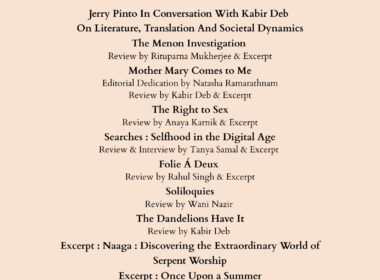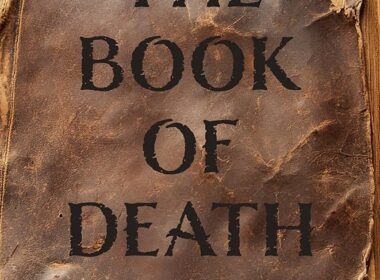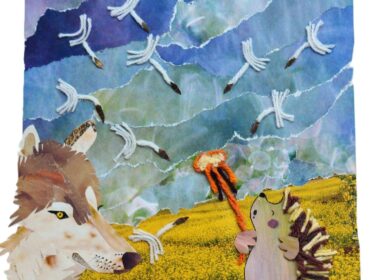Excerpt In Those Days There Was No Coffee

Image Courtesy of Simon and Schuster India
No Coffee for Dalits
Nothing brings to the fore this discrimination more than an incident that occurred in the Kolar Gold Fields (KGF). On 13 July 1927 a curious case came before the First-Class Special Magistrate Narayanasamy Iyengar’s court in the Champion Reef compound of KGF. The Times of India described it as ‘a sensational case in which deep interest was evinced’ by the whole community.
On 6 November 1925, the plaintiff M. Ramaswamy hadvisited Venkatesa Vilas Coffee Hotel, an eating joint, inRobertsonpet. The coffee hotel was a nondescript place, where, in the late afternoons, a dozen or so customers would come to have coffee and some snacks. That afternoon, the small crowd included an employee of the restaurant, some Muslims, and a few from the Naidu, Mudaliar and Marwari communities. Ramaswamy was accompanied by two of his acquaintances. At least one of them was a Brahmin, S. Murthy. A qualified barrister, Murthy had joined the non-cooperation movement in 1920–21, and campaigned against untouchability.
Ramaswamy ordered three cups of coffee. At this moment, one of the customers, Gangadhara Mudali—an assistant at the local tobacconist—beckoned the server, pointed to Ramaswamy, referred to him as ‘a Paraiyan, a Malavadu’, and demanded that coffee not be served to him. The surprised waiter took the coffee away. Infuriated by this slur, an angry Ramaswamy stood up and walked out. Another report has it that he wanted to assault Gangadhara Mudali but was pacified by his companions, and all of them walked out without sipping the coffee.
The coffee hotel lost Rs 0–3–9 of custom that afternoon, and subsequently another two annas: the hotel hired a local Brahmin, who supplied masala vadais to the hotel and also doubled up as a priest, to ‘clean’ the hotel and rid it of its ‘pollution’ with mantras and other orthodox rituals occasioned by the ingress of a Dalit into an eating space.
A Dalit being turned out of a restaurant should not have been breaking news at that time. But KGF was no ordinary place. Predominantly populated by lower-caste Tamil-speaking labourers, who had migrated to work in the gold mines of Kolar, then in the princely state of Mysore, they were radicalised by a Neo-Buddhist movement launched by Ayotheedas Pandithar at the turn of the twentieth century.
As a radical thinker critical of caste society, Pandithar held strong views on discrimination in coffee hotels. When the basis of business was the provision of goods and services for money, he asked, why should some classes of people be excluded. Questioning the signboards that prohibited the entry of Christians, Panchamas and Muslims into coffee hotels, in his typical strategy of inversion, he argued that it was these communities which had the competence to make good coffee. His argument ran thus: Coffee was a European drink. And it was
Christians and Panchamas who interacted with European Sahibs who were familiar with good coffee. And what were Brahmins good for? Only to dilute curds and buttermilk with water and sell it off after spicing it up with some salt.
Ramaswamy, who had been turned out of the coffee hotel, was no passive victim to be cowed down. Employed as a wire rope inspector in the Champion Reef Gold Mine, he had converted to Buddhism five years earlier. Taking the panchsheel, he was training to be a catechist so that he could deliver discourses on Buddhism. He was also the honorary treasurer of the local Buddhist association. The hotel owner was unaware of Ramaswamy’s background. Maganlal Jain, who manned the till at the coffee hotel, promptly forgot all about this after the cleansing ritual. It was some months later, when Ramaswamy filed a defamation suit, that the hotel employee remembered the incident.
In a caste-bound society the verdict was a foregone conclusion. After examining the witnesses, the magistrate discharged the accused. Gangadhara Mudali bore no ill-will towards Ramaswamy; he had only thought that as an Adi Dravidar he should not be served in that particular hotel, ‘a view shared by others’. As proof, the magistrate pointed out that when the waiter’s attention was drawn to this fact, he went back to the kitchen without serving the coffee. Further, neither Ramaswamy nor his companions had told the management that he was no longer an Adi Dravidar but a Buddhist and therefore ‘entitled to take coffee’ at that establishment.
Disappointed with the outcome, Ramaswamy went on appeal and filed a revision petition before S. Hiriyannah, the District Magistrate of Kolar. No less than a Barrister from Madras—E.L. Iyer, a renowned labour activist, and the editor and publisher of India’s first English language labour weekly, the Swadharma— was hired. The case was truly high profile, especially for a small labouring town, and according to reports, crowds milled in the court premises.
E.L. Iyer made a case on two grounds. First, he argued that the defendant had called Ramaswamy a Paraiyar despite being aware of the fact that he had converted to Buddhism. Second, he contended that even though his client was a ‘Paraiyar’, to call him so was illegal according to British Law and Mysore Law. He should have been referred to only as Adi Dravidar.
The defendant’s lawyer contended that he was unaware of Ramaswamy’s conversion to Buddhism. Further, he had used the word ‘Paraiyar’ only in a descriptive sense, and therefore no defamation was attached to it. E.L. Iyer was at his best in cross- examining the witnesses. But eventually, the District Magistrate too dismissed the case.
If anything, this case demonstrates how well caste was institutionalised in the coffee hotels in late colonial South India.
Even after such discrimination had formally been abolished by the time of Indian independence, Periyar launched a campaign to remove the adjective ‘Brahmin’ from the names of hotel establishments. His first successful attempt was at railway canteens where separate sections were designated for Brahmins. Periyar called upon the government to cancel licences issued to establishments persisting with the use of ‘Brahmin’ in their nomenclature. ‘Caste oppression in its experiential form is largely determined through food. Therefore, why should the government permit the use of caste in the names of hotels?’83 In a well-known agitation in the 1950s, Periyar tarred the word ‘Brahmin’ on the nameplate of Murali’s Cafe in Tiruvallikkeni, Madras.
Excerpted with permission from In Those Days There Was No Coffee by A.R. Venkatachalapathy published by Simon & Schuster India 2025.
A.R. Venkatachalapathy (1967), historian and Tamil writer, is a Professor at the Madras Institute of Development Studies, Chennai. He has taught at universities in Tirunelveli, Chennai, Singapore, and Chicago. A recipient of the V.K.R.V. Rao Prize, the Mahakavi Bharati Award, and the Ramnath Goenka Award he has also received the Vilakku Pudumaippithan Award and Iyal Virudhu, both for lifetime contribution to Tamil. In 2024, he won the Sahitya Akademi award for Tamil.
Venkatachalapathy has written/edited over thirty books in Tamil. His publications in English include Swadeshi Steam: V.O. Chidambaram Pillai and the Battle Against the British Maritime Empire (winner of the Ramnath Goenka Award for Excellence (non-fiction, 2024)); The Brief History of a Very Big Book: The Making of the Tamil Encyclopaedia; Tamil Characters: Personalities, Politics, Culture; Who Owns That Song?: The Battle for Subramania Bharati’s Copyright; and The Province of the Book: Scholars, Scribes, and Scribblers in Colonial Tamilnadu.

Image Source : Kerala Literature Festival




